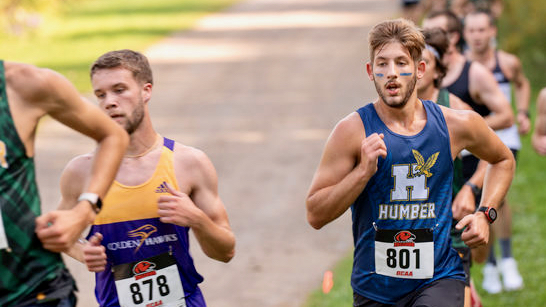Humber varsity cross country runner Liam Bauman balances the thin line between sport-related pain and passion.
All cross country runners know they will go through hell in a race, the extreme fatigue, the shortness of breath and burning muscles. The whole body just hurts.
“But that is the fun part, dealing with that pain,” said Liam Bauman, one of the members of the Humber cross-country team. “I embrace the pain because it is going to happen, even in the workouts, you have to go with that mindset.”
Pain management is a big part of cross country and can separate those who win, and those who don’t reach the podium. Those who beat the pain, wins the race.
Hawks head coach Scott Skimming suggests there is a complex inner struggle runners have with themselves, the battle of wanting to give up and stop, and the self that wants to compete.
“Athletes need to understand that their brains are hardwired to protect the body and that the safety factor between their mental breakers and their actual physical limits is large,” he said.
Skimming said pushing past the mental barriers takes practice and athletes need to get comfortable being uncomfortable.
The suffering in cross-country training and competition is not vain. Bauman has reasons he endures it.
“You can think cross country is individual, but is also a team sport, so you have to fight for the team and yourself,” the first-year Kinesiology student said.
“You don’t want to finish knowing that you could have done more or you could have gone faster. When you overcome this suffering, it’s definitely rewarding,” Bauman said.

Liam Bauman balances the thin line between sport-related pain and passion in collegiate cross country. Photo credit: Humber Hawks
Skimming said part of what runners do is keep a clear mind and focus on their objectives during a race.
“Ideally athletes stay extrospective when racing,” he said. “If they focus on their goals, their environment and reading their competitors, they can minimize the hardship they are enduring and the negativity introspection might offer.”
Although long-distance runners train to tolerate pain better than others, the strain on body and mind can be part of the training, the Hawks’ head coach said.
“Training is where we prepare athletes for the rigours of racing,” he said.
“The goal is to reduce the safety factor by providing specific pieces of work that push them past their current mental breakers for short, controlled amounts of time so they know they can go there and what it is going to feel like.”
It’s in training as well where athletes learn the different ways to deal with the different kinds of fatigue and aches like calf cramps, annoying during practice, but devastating in a race.
Whenever problems like that arise, that’s where Bauman uses the mental aspect of the sport.
“You have to keep talking to yourself. You have to tell yourself that you are capable of it,” he said.
But the cramps are but one of the ways the stressors appear along with a lack of breath or a side stitch.
Bauman is more than familiar with all of them as he works out six days a week. The pain is a way of life. The pain is a pleasure.
“Is it possible to enjoy suffering? I think so,” he said.

